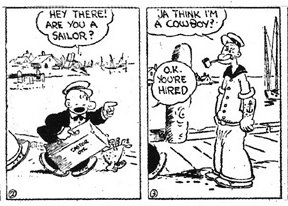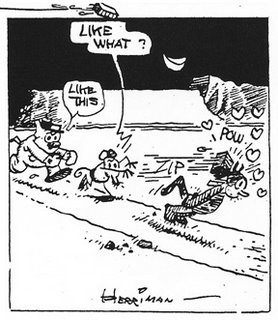I did not grow up in the Baptist church and can't claim to know what goes on in those arcane halls, but a number of my post-Baptist friends often bring up the idea of dispensationalism. Apparently it is taught as "God had Plan A (the law), but that didn't work, so He had to come up with Plan B (the cross)." This presupposes the idea that man could, and was expected to, earn his salvation under the law. Any serious OT student knows that doesn't ring true. This confused me, because most of my Christian life I've studied out of the Scofield Reference Bible, C.I. Scofield being one of the early proponents of dispensationalism, but never did I come across the Plan A/Plan B idea. So I have to conclude that dispensationalism has been corrupted by the people teaching it now.
My further comment would be that I don't think dispensationalism should be considered a doctrine. To me it's no more than a useful roadmap to the revelation of the cross. It's noteworthy that at each of the seven dispensations that Scofield identifies, a major type of Christ is revealed, until you get to the sixth dispensation, the Church, at which point the antitype has already appeared. Anyway, just so you know, here is the footnote that the Scofield Bible places at Gen. 1:28.
"A dispensation is a period of time during which man is tested in respect to his obedience to some specific revelation of the will of God.
"Three important concepts are implied in this definition: 1) a deposit of divine revelation concerning God's will, embodying what God requires of man as to his conduct; 2) man's stewardship of this divine revelation, in which he is responsible to obey it; and 3) a time period, often called an "age," during which this divine revelation is dominant in the testing of man's obedience to God.
"The dispensations are a progressive and connected revelation of God's dealings with man, given sometimes to the whole race and at other times to a particular people, Israel.
These different dispensations are not separate ways of salvation. During each of them man is reconciled to God in only one way, i.e. by God's grace through the work of Christ that was accomplished on the cross and vindicated in His resurrection. Before the cross man was saved in prospect of Christ's atoning sacrifice, through believing the revelation thus far given him. Since the cross man has been saved by believing on the Lord Jesus Christ in whom revelation and redemption are consummated.
"On man's part the continuing requirement is obedience to the revelation of God. This obedience is a stewardship of faith. Although the divine revelation unfolds progressively, the deposit of truth in the earlier time periods is not discarded; rather it is cumulative. Thus conscience (moral responsibility) is an abiding truth in human life, although it does not continue as a dispensation. Similarly, the saved of this present dispensation are "not under law" as a specific test of obedience to divine revelation, yet the law remains an integral part of the Holy Scriptures which, to the redeemed, are profitable for 'instruction in righteousness.'
"The purpose of each dispensation, then, is to place man under a specific rule of conduct, but such stewardship is not a condition of salvation. In every past dispensation unregenerate man has failed, and he has failed in this present dispensation and will in the future. But salvation has been and will continue to be available to him by God's grace through faith.
"Seven dispensations are distinguished by Scofield: Innocence (Gen. 1:28); Conscience or Moral Responsibility (Gen. 3:7); Human Government (Gen. 8:15); Promise (Gen. 12:1); Law (Ex. 19:1); Church (Acts 2:1); Kingdom (Rev. 20:4)."
© 1967 Oxford University Press, Inc.






